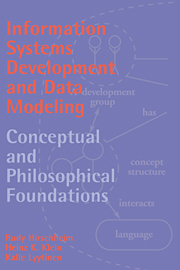Book contents
- Frontmatter
- Contents
- Preface
- Acknowledgements
- 1 Introduction
- 2 Definition and Evolution of Information Systems Development Methodologies and Data Modeling
- 3 Philosophical Foundations
- 4 Conceptual and Paradigmatic Foundations of ISD
- 5 Paradigmatic Analysis of ISD Methodologies
- 6 Conceptual and Paradigmatic Foundations of Data Modeling
- 7 Paradigmatic Analysis of Data Modeling Approaches
- 8 Conclusions
- Appendix A Summaries of Selected Methodologies
- Bibliography
- Index
5 - Paradigmatic Analysis of ISD Methodologies
Published online by Cambridge University Press: 05 November 2011
- Frontmatter
- Contents
- Preface
- Acknowledgements
- 1 Introduction
- 2 Definition and Evolution of Information Systems Development Methodologies and Data Modeling
- 3 Philosophical Foundations
- 4 Conceptual and Paradigmatic Foundations of ISD
- 5 Paradigmatic Analysis of ISD Methodologies
- 6 Conceptual and Paradigmatic Foundations of Data Modeling
- 7 Paradigmatic Analysis of Data Modeling Approaches
- 8 Conclusions
- Appendix A Summaries of Selected Methodologies
- Bibliography
- Index
Summary
Introduction
This chapter explores, via a paradigmatic assumptions analysis, four theoretically appealing information systems development methodologies (i.e. process-oriented approaches to ISD). Such an analysis is prompted in part by a broadening of the conceptual base in the most recent literature on ISD. At present one can identify several systems development research communities that have coalesced around different paradigmatic beliefs (in the sense of Kuhn 1970) which inform their research efforts. Some researchers have been attracted by the emergence of alternative theoretical foundations and are using them to inspire new ways of thinking about ISD. Examples of such theoretical foundations for ISD are speech act theory, activity theory, critical social theory, self-referential systems theory, semiotics, structuration theory or, with a reactionary turn to the classics, Mao's theory ‘On Contradiction’.
However, many of these new ways of thinking about ISD (some might refer to them as ‘schools’ of ISD) are not driven by an explicit reflection of the philosophical groundings upon which a new theoretical base could be formed. To help understand this issue more clearly, this chapter provides an ex post reconstruction of the philosophical grounding for four influential ‘schools’ of ISD. Our attempt parallels the paradigmatic analysis of contemporary schools of IS by Iivari (1991). However, our goals in selecting these schools were somewhat different.
Selection of Approaches and Plan of Analysis
Whereas Iivari's (1991) purpose was to cover all the major schools of thought in IS development, our initial goal was one of illustrating the influence of the four paradigms in current approaches to ISD.
- Type
- Chapter
- Information
- Information Systems Development and Data ModelingConceptual and Philosophical Foundations, pp. 99 - 143Publisher: Cambridge University PressPrint publication year: 1995



